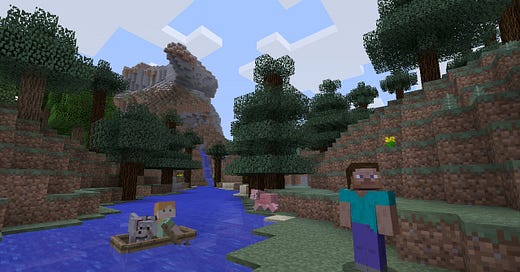As somebody who has published five books that are all heavily research-based but still presented from a singular perspective, I want to impart some wisdom to those of you who have a wealth of knowledge to share, but not the writing skills to create your own. You may see your role differently by the time I’m done.
First, let’s talk about a problem I’ve noticed, which I call the “missing middle”. Put simply, people are always interested in surface-level things, as well as the final conclusion about the matter, but almost never the large body of evidence that leads from the surface to the conclusion. They want the “spoilers” for life, basically. This allows them to be lied to very easily. It’s also why you, as an independent thinker who hates being lied to, should be excited about the missing middle.
There is no purer medium for learning than books. If you really want to understand a topic, you probably need to read at least one book on it. If you think about it, that’s mostly what college is. They just tell you what to read, and you prove that you did. Heck, if you stay in that system long enough you can become certified on the topic! But you don’t have to go to college to read those books, and you can find better ones if you’re smart. Let the whole world be your college, and instead of writing a thesis for a professor to be graded, you can write it as a book and share it with a circle of people you actually respect.
Why we feel inadequate
Schools (all the way from kindergarten to universities) have destroyed the pursuit of knowledge. They are designed to break the human soul, and turn all future leaders into a mass-produced consumers. I didn’t realize how deliberate this was until I read The Underground History of American Education by John Taylor Gatto, which changed my life. For the first time, I saw how my hatred of the “middle knowledge” was not natural. It wasn’t part of my personality. It had been very carefully instilled in me, by a system too big to comprehend, stretching back over a hundred years. It was meant to castrate me intellectually, and it almost did.
Kids are naturally curious, gravitating to deeper pools of knowledge, with fixations and obsessions that can go on for a lifetime if fostered. Look at how kids can play Minecraft for thousands of hours and still be building their own worlds, installing mods, and sharing their experiences without any instructions, incentive programs, or even structure! They are not just problem solving, but looking up guides, understanding systems, and creating their own challenges. Unfortunately it’s all digital. Back when kids were free to roam and explore in real life, they were just as curious about how the real world worked. Parents hand their kids off to be lobotomized by government employees, while the kids are trying to keep the last embers of their critical thinking alive by escaping into a virtual world where their choices are respected and they have the freedom to experiment.
What kind of author are you?
My favorite books are written by people who make their intellectual passions personal. They not only find the topic interesting, they want to share their own personal experience of dealing with it. Fringe journalists like Jon Ronson, who wrote The Men Who Stare At Goats, can be hilariously frank about their discomfort with their own research, and share personal anecdotes. He’s not writing a damn university paper, he’s a human being trying to make sense of the world! And then you have the cynical, award-winning grade school teacher himself, John Taylor Gatto, who starts off with his own story of fighting the system, and never lets you forget that there is a side to choose while he is giving you the “middle knowledge” you didn’t know you needed.
If you’re considering being an author, I ask that you completely forgo to the mirage of unbiased, academic, or professional writing. Go ahead and be biased; I want to know why you’re biased, and I want you to convince me that I should be too. Say things that you can’t prove, and then be honest about that. Tell me your theories, your intuition, and a story about your life that taught you how the world works, and why you think it applies to a seemingly unrelated topic. Take a good hard look at yourself, and make a case for why the sum total of your life adds up to a worthwhile perspective. Pick a topic that you really do have a strong, informed point of view about, and fight for it. Or joke about it. Or make us cry about it. Or intrigue us about it. Or all of the above.
Of course, if you intend to go off about a detailed factual subject, it’s best that you have sources. Not so that academics can cite your work in their next peer-reviewed publication, but so that the reader can trust that you’re not outright lying. But for what it’s worth, I’ve also read plenty of fascinating, respected books by famous authors who just kind of tell you stuff, and don’t bother proving it. (And often, the things they do decide to cite feel random compared to the major factual claims that they just leave uncited.)
Subjects are interesting, but getting a stranger to see why they’re interesting requires the personal element. It requires you, as a human.
Bringers of salt
Many of you will know that I have a favorite Bible verse to guide me as a creator:
You are the salt of the earth. But if the salt loses its savor, how can it be made salty again? It is no longer good for anything, except to be thrown out and trampled by men.
—Matthew 5:13
You may not realize what this means. I have a theory, at least. For all of its drama, the world is flavorless on its own. Events happen, people die, people get born, and nature continues on forever, like we read in the book of Ecclesiastes. “All is vanity!” he says. But when we have a spirit of love for our fellow man, and an irrational devotion to God, and a hope of the redemption, we make the world a more interesting place. We are the salt of the world, because our perspective infuses this crappy world with something to savor. We bring out the truth, and make it appealing.
The same thing is true of information, ideas, and truth. Knowledge without passion is like eating raw vegetables, or unseasoned chicken breast. It may be good for you, but it’s unappealing. If you want to write, don’t try to kill your emotions. Let your inner child speak. Be human enough to feel vulnerable. Far from being a problem, it will be exactly what makes your work special.






Thank you, Terry. It was a refreshing reminder to step outside the world of perceived expectations and let sincerity and curiosity take precedence.
Thank you so much for writing this piece - the type of storyteller you describe is the one that I am praying God helps me to become even if it scares me ✨